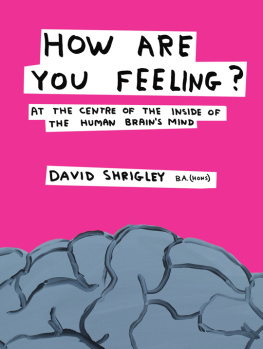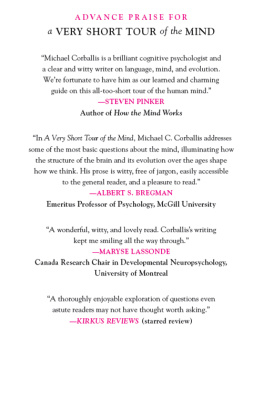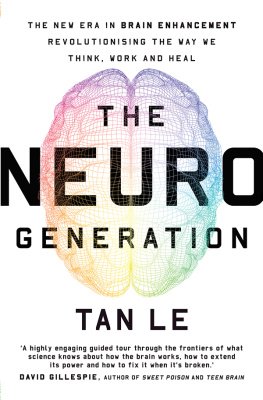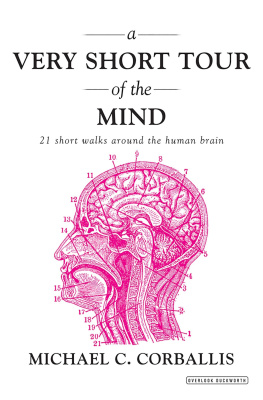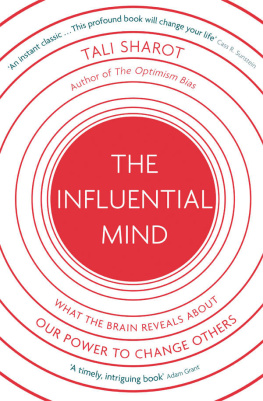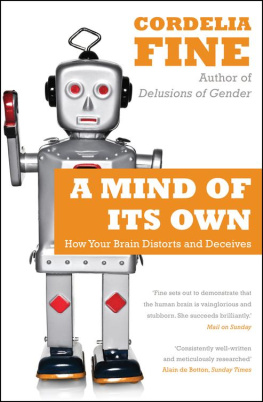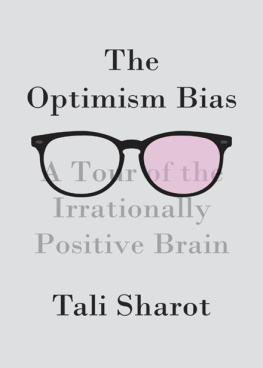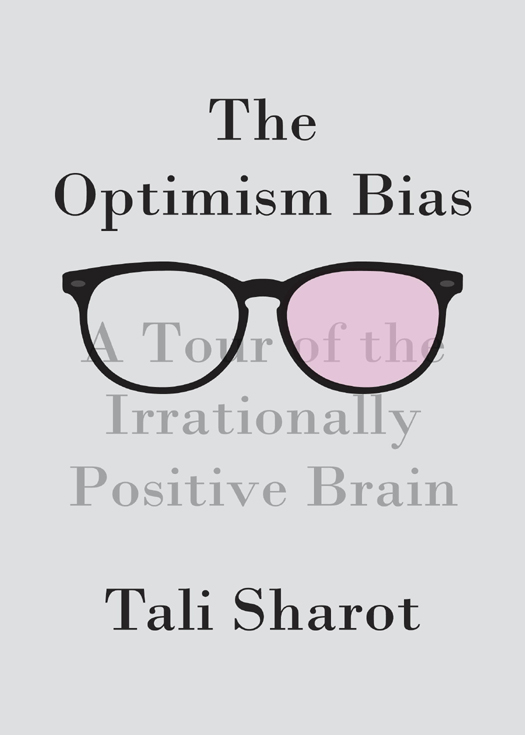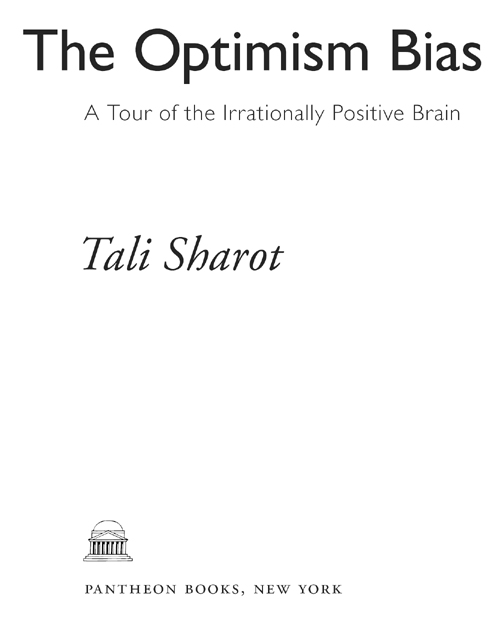Copyright 2011 by Tali Sharot
All rights reserved. Published in the United States by Pantheon Books, a division of Random House, Inc., New York.
Pantheon Books and colophon are registered trademarks of Random House, Inc.
Library of Congress Cataloging-in-Publication Data
Sharot, Tali.
The optimism bias : a tour of the irrationally positive brain / Tali Sharot.
p. cm.
eISBN: 978-0-307-37983-2
1. Neuropsychology. 2. OptimismPhysiological aspects. I. Title.
QP 360. S 466 2011 612.8dc22 2010039692
www.pantheonbooks.com
Jacket design by Peter Mendelsund
v3.1
For my parents
Tamar and Steve Sharot
Contents
Which Way Is Up?
Illusions of the Human Brain
Are Animals Stuck in Time?
The Evolution of Prospection
Is Optimism a Self-Fulfilling Prophecy?
How the Mind Transforms Predictions into Reality
What Do Barack Obama and Shirley Temple Have in Common?
When Private Optimism Meets Public Despair
Can You Predict What Will Make You Happy?
The Unexpected Ingredient for Well-being
Crocuses Popping Up Through the Snow?
When Things Go Wrong: Depression, Interpretation, and Genes
Why Is Friday Better Than Sunday?
The Value of Anticipation and the Cost of Dread
Why Do Things Seem Better After We Choose Them?
The Minds Journey from Expectation to Choice and Back
Are Memories of 9/11 as Accurate as They Seem?
How Emotion Changes Our Past
Why Is Being a Cancer Survivor Better Than Winning the Tour de France?
How the Brain Turns Lead into Gold
A Dark Side to Optimism?
From World War II to the Credit CrunchUnderestimating Risk Is Like Drinking Red Wine
EPILOGUE: A Beautiful Mademoiselle or a Sad Old Lady?
From Prediction to Perception to Action
Prologue
A Glass Forever Half Full?
I would have liked to tell you that my work on optimism grew out of a keen interest in the positive side of human nature. That would be a pleasant story: A Cognitive Neuroscientist in Search of the Biological Basis of Our Hopeful Souls. Pleasant but, unfortunately, untrue. I stumbled upon the optimism bias quite by accident while investigating peoples memories of the largest terrorist attack of our time. Back then, my scientific interests inclined more to the dark side: My principal research had been aimed at understanding how traumatic events shape our memories. I was interested in how the brain tricks us into believing that our recollections of exceptionally emotional events, such as the occurrences of September 11, 2001, are as accurate as a videotape, even when we are utterly mistaken.
I had been conducting research at New York University for over a year when American Airlines Flight 11 and United Flight 175 were flown into the World Trade Center at 430 miles per hour. Shock, confusion, and fear were the common responses on the street. Such forceful emotions are exactly the sort of reactions that will generate unusually vivid memories, ones that are reluctant to fade away. These are commonly referred to as flashbulb memories because of their sharp-edged, picturelike qualities. In we remember unexpected arousing events and how the structures deep in our brain Photoshop these images, adding contrast, enhancing resolution, inserting and deleting details.
I was puzzled: Why had our brains developed a mechanism that would create highly vivid memories that were not necessarily accurate? Around the time my colleagues and I published our scientific investigation of memories of 9/11,
Brain-imaging studies show that the same brain structures that are engaged when we recollect our past are called upon when we think of the future. These two fundamental human thought activities rely on the same brain mechanisms; they draw on similar information and underlying processes. To imagine your upcoming trip to Barbados, for example, you need a system that can flexibly reconstruct novel scenarios, one that can take bits and pieces of memories from your past (your last vacation to a warm country, images of sandy beaches, your partner in his swimsuit) and bind them together to create something new (you and your loved one wearing straw hats on a beach in Barbados next month)an event that has yet to happen. Because we use the same neural system to recall the past as we do to imagine the future, recollection also ends up being a reconstructive process rather than a videolike replay of past events, and thus is susceptible to inaccuracies.
Was this theory correct? To discover the answer, I would record peoples brain activity while they imagined future events, then compare that activity to the pattern I observed when they were recollecting past events.
The plan was simple. However, when I asked my volunteers to imagine future life events, something unexpected occurred. Even when given specific situations of the most humdrum kind (getting an ID card, playing a board game), people tended to fashion magnificent scenarios around them. They kept painting the most perfectly gray events in shades of pink.
You would think that imagining a haircut in the future would be somewhat dull. Not at all. Getting a haircut today may be boring, but getting one in the future is a cause for celebration. Here is what one of my participants wrote:
I projected that I was getting my hair cut to donate to Locks of Love [the nonprofit organization that provides hairpieces to children suffering from hair loss]. It had taken me years to grow it out and my friends were all there to help celebrate. We went to my favorite hair place in Brooklyn and then went to lunch at our favorite restaurant.
I asked another participant to imagine a ferry ride. She responded:
One to two years from now I see myself taking the ferry to the Statue of Liberty. The weather would be really nice and windy, so my hair would be blowing everywhere.
The world, only a year or two into the future, was a wonderful place to live in. I spent hours with a student of mine, Alison Riccardi, trying to come up with exceptionally unexciting events that surely couldnt provide any cause for celebration. All to no avail. Once people started imagining, the most banal life events seemed to take a dramatic turn for the better, resulting in a life that was just a bit less ordinary.
These responses switched on a red (or at least pinkish) light in my mind. I was surprised by this tremendously powerful, seemingly automatic inclination to imagine a bright future. If all
How does the brain generate hope? How does it trick us into moving forward? What happens when it fails? How do the brains of optimists differ from those of pessimists? Although optimism is vital for our well-being and has an enormous impact on the economy, these questions have been left unanswered for decades. In this book, I argue that humans do not hold a positivity bias on account of having read too many self-help books. Rather, optimism may be so essential to our survival that it is hardwired into our most complex organ, the brain.
From modern-day financial analysts to world leaders, newlyweds (all described in ), optimism biases human and nonhuman thought. It takes rational reasoning hostage, directing our expectations toward a better outcome without sufficient evidence to support such a conclusion.


